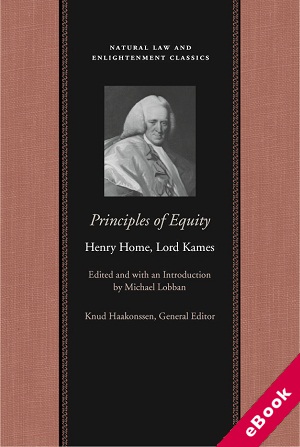
The device(s) you use to access the eBook content must be authorized with an Adobe ID before you download the product otherwise it will fail to register correctly.
For further information see https://www.wildy.com/ebook-formats
Once the order is confirmed an automated e-mail will be sent to you to allow you to download the eBook.
All eBooks are supplied firm sale and cannot be returned. If you believe there is a fault with your eBook then contact us on ebooks@wildy.com and we will help in resolving the issue. This does not affect your statutory rights.
Henry Home, Lord Kames, was the complete “Enlightenment man,” concerned with the full spectrum of human knowledge and its social use. However, as a lawyer and, after 1752, as a judge on the Court of Session in Edinburgh, he made many of his most distinctive contributions through his works on the nature of law and legal development. Principles of Equity, first published in 1760, is considered his most lasting contribution to jurisprudence and is still cited. In his jurisprudence, Kames specifically sought to explain the distinction between the nature of equity and common law and to address related questions, such as whether equity should be bound by rules and whether there should be separate courts of law and equity.
Beginning with a general introduction on the rise and nature of equity, Principles of Equity is divided into three books. The first two, “theoretical,” books examine the powers of a court of equity as derived from justice and from utility, the two great principles Kames felt governed equity. The third book aims to be more practical, showing the application of these powers to several subjects, such as bankrupts. Kames drew his illustrations of the principles of equity from the case law of the Court of Session as well as the English Chancery, both because he felt that the rules of equity must be the same in every country where law was cultivated, and because he hoped his work might promote a closer union between the law of the two kingdoms. Principles of Equity is significant as an example of the approach of an Enlightenment thinker to practical legal questions and as an early attempt to reduce law to principles. Kames himself saw this as his most important work, and scholars both of his theory and of the broader Scottish Enlightenment will find it gives essential insights into the thought of this central figure. There is evidence that this book was well known in the formative years of the United States and that both Benjamin Franklin and Thomas Jefferson were familiar with Kames’s treatise.